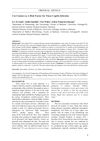 21 citations,
February 2013 in “Clinics in Dermatology”
21 citations,
February 2013 in “Clinics in Dermatology” New treatments for advanced skin cancer are improving patient outcomes, but drug resistance and finding the right treatment combinations are still big challenges.
 10 citations,
May 2020 in “Dermatology Research and Practice”
10 citations,
May 2020 in “Dermatology Research and Practice” Proteoglycans are important for hair growth, and a specific treatment can help reduce hair loss.
 37 citations,
January 2002 in “British journal of dermatology/British journal of dermatology, Supplement”
37 citations,
January 2002 in “British journal of dermatology/British journal of dermatology, Supplement” Apple extract called procyanidin B-2 was found to greatly increase hair growth.
 3 citations,
October 2011 in “QJM”
3 citations,
October 2011 in “QJM” The drugs finasteride and dutasteride reduce low-grade prostate cancers but may double the risk of high-grade cancers.
13 citations,
April 2013 in “Immunotherapy” Inhibiting PLA2 enzymes may help treat inflammatory skin diseases like psoriasis and dermatitis.
65 citations,
February 2011 in “Molecular cancer therapeutics” CCT128930 is a promising new drug that effectively targets and inhibits a cancer-related protein, showing potential for cancer treatment.
52 citations,
July 2001 in “Molecular and cellular endocrinology” Activin A helps heal skin wounds and protects the brain after injury.
 6 citations,
July 2016 in “Gynecological Endocrinology”
6 citations,
July 2016 in “Gynecological Endocrinology” PSA levels are higher in women with PCOS, but FAI is a more accurate marker for diagnosis.
 October 2024 in “Dermatologic Surgery”
October 2024 in “Dermatologic Surgery” PRP and PRF show promise for hair growth but need more research for consistent and safe use.
 8 citations,
June 2016 in “Clinical Chemistry”
8 citations,
June 2016 in “Clinical Chemistry” PSA levels could help detect illegal steroid use in female athletes but face challenges like cost and PCOS prevalence.
 10 citations,
January 2013 in “Journal of skin cancer”
10 citations,
January 2013 in “Journal of skin cancer” PKC ε increases hair follicle stem cell turnover and may raise skin cancer risk.
 18 citations,
August 2015 in “Biochemical and Biophysical Research Communications”
18 citations,
August 2015 in “Biochemical and Biophysical Research Communications” XEDAR triggers a specific signaling pathway in cells.
 5 citations,
May 2020 in “Dermatologic Therapy”
5 citations,
May 2020 in “Dermatologic Therapy” 5-alpha reductase inhibitors might worsen lung recovery in COVID-19 patients, suggesting a pause in their use.
 October 2023 in “The Egyptian Journal of Hospital Medicine ”
October 2023 in “The Egyptian Journal of Hospital Medicine ” PSA might help diagnose PCOS and related skin issues, but more research is needed.
 January 2015 in “Springer eBooks”
January 2015 in “Springer eBooks” Hair shedding that lasts more than 6 months may need medical tests, but often just reassurance is enough.
60 citations,
July 2014 in “Autophagy” The protein FLCN is involved in cellular cleanup and is regulated by ULK1.
 March 2022 in “Berkala Ilmu Kesehatan Kulit dan Kelamin/Berkala ilmu kesehatan kulit dan kelamin (Periodical of dermatology and venerology)”
March 2022 in “Berkala Ilmu Kesehatan Kulit dan Kelamin/Berkala ilmu kesehatan kulit dan kelamin (Periodical of dermatology and venerology)” Touching cats can increase the risk of getting a fungal scalp infection, especially in boys and kids over 5.
 March 2024 in “Journal of Microbiology and Biotechnology”
March 2024 in “Journal of Microbiology and Biotechnology” Phloroglucinol may help improve hair loss by promoting hair growth and reducing oxidative stress.
 52 citations,
October 2010 in “Antiviral Therapy”
52 citations,
October 2010 in “Antiviral Therapy” New treatments for Hepatitis C show promise but need more research to confirm their safety and effectiveness for clinical use.
 February 2023 in “Scientific Reports”
February 2023 in “Scientific Reports” Cold Atmospheric Microwave Plasma (CAMP) helps hair cells grow and could potentially treat hair loss.
 47 citations,
November 2012 in “Expert Opinion on Therapeutic Patents”
47 citations,
November 2012 in “Expert Opinion on Therapeutic Patents” The document concludes that research on sulfatase inhibitors should continue due to their potential in treating various diseases, despite some clinical trial failures.
 25 citations,
August 2014 in “Endocrinology”
25 citations,
August 2014 in “Endocrinology” Researchers created a mouse model of a type of rickets that does not cause hair loss.
 15 citations,
April 2022 in “Immunology”
15 citations,
April 2022 in “Immunology” Men and women get COVID-19 at similar rates, but men tend to get sicker and have a higher risk of dying, while women usually have stronger immune responses and vaccine reactions.
130 citations,
January 2000 in “Nature biotechnology”  16 citations,
January 2000 in “The Journal of clinical endocrinology and metabolism/Journal of clinical endocrinology & metabolism”
16 citations,
January 2000 in “The Journal of clinical endocrinology and metabolism/Journal of clinical endocrinology & metabolism” Antiandrogen drugs can reduce PSA levels in women with excess hair, suggesting PSA is a sign of male hormone activity in women.
 32 citations,
July 2020 in “Journal of The American Academy of Dermatology”
32 citations,
July 2020 in “Journal of The American Academy of Dermatology” AGA linked to worse COVID-19 outcomes in men.
 9 citations,
November 2021 in “Infectious Agents and Cancer”
9 citations,
November 2021 in “Infectious Agents and Cancer” Androgen deprivation therapy doesn't lower the risk of death from COVID-19 in prostate cancer patients.
 January 2021 in “Journal of the European Academy of Dermatology and Venereology”
January 2021 in “Journal of the European Academy of Dermatology and Venereology” PrEP doesn't increase STI risk in high-risk men, anti-androgen drugs may lower ICU admission for male COVID-19 patients, a 3-point injection is better for crow's feet, and the 'Geriatric-8' tool could help assess frailty in older skin cancer patients.
1 citations,
September 2021 in “Advances in skin & wound care” SARS-CoV-2 might infect and multiply in skin tissue, possibly aiding in its transmission.
 February 2006 in “Journal of The American Academy of Dermatology”
February 2006 in “Journal of The American Academy of Dermatology” Terbinafine is more effective than itraconazole for toenail fungus, especially in older patients, and debridement improves its effectiveness.
























